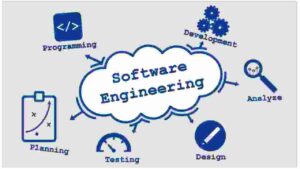Software Development & Engineering
-
Introduction of Software Development & Engineering
-
Software development and engineering is a dynamic field that focuses on designing, building, and maintaining software applications and systems. It involves a combination of coding, problem-solving, and system architecture to create efficient and scalable solutions for businesses and consumers. Software engineers and developers work with various programming languages, frameworks, and tools to develop everything from mobile apps and websites to complex enterprise software and embedded systems. This field also includes practices like DevOps, agile development, and cloud computing to enhance productivity and software reliability. With technology constantly evolving, software development continues to be one of the most in-demand and innovative career paths in the IT industry.
-
 Software Engineer
Software Engineer -
Software development & enginer.
-
A software engineer is a problem solver who designs, develops, and maintains software applications that power everything from mobile apps to large-scale enterprise systems. They work with various programming languages, frameworks, and tools to create efficient and scalable solutions tailored to user needs. Beyond just writing code, software engineers collaborate with designers, product managers, and other developers to ensure seamless functionality and a great user experience. They also debug issues, optimize performance, and stay updated with emerging technologies to improve their craft. Whether building innovative applications, automating processes, or enhancing cybersecurity, software engineers play a crucial role in shaping the digital world.
-
Full-Stack Developer
-
A full-stack developer is a versatile programmer skilled in both front-end and back-end development, allowing them to build complete web applications from start to finish. They work with front-end technologies like HTML, CSS, and JavaScript to create engaging user interfaces while also managing server-side logic, databases, and APIs using languages like Python, Node.js, or Java. Full-stack developers are problem-solvers who understand the entire software development lifecycle, from designing user experiences to ensuring efficient data handling and security. Their ability to bridge the gap between front-end aesthetics and back-end functionality makes them valuable assets in tech-driven industries, enabling them to develop seamless, responsive, and scalable applications.
-
Front-End Developer
- A Front-End Developer is a creative problem-solver who bridges the gap between design and functionality, crafting seamless user experiences on the web. They specialize in HTML, CSS, and JavaScript, transforming static designs into dynamic, interactive interfaces that adapt across devices. Beyond coding, they optimize performance, enhance accessibility, and ensure smooth user interactions through frameworks like React, Vue, or Angular. Constantly evolving with industry trends, a Front-End Developer blends technical precision with an eye for aesthetics, making the digital world more engaging and user-friendly.
-
Back-End Developer
-
A Back-End Developer is responsible for making websites and apps work behind the scenes. They use programming languages like Python, Java, or PHP to build servers, databases, and application logic. Their job is to store and manage data, process user requests, and ensure everything runs smoothly. While users see the front-end of a website, the back-end is what powers it, making sure information is saved, retrieved, and displayed correctly. Without Back-End Developers, websites and apps wouldn’t function properly
-
 DevOps Engineer
DevOps Engineer -
DevOps Engineer is a key player in modern software development, focusing on automating and streamlining the process of building, testing, and deploying applications. They bridge the gap between development and operations teams, ensuring smooth collaboration and faster delivery of high-quality software. Using tools like Docker, Kubernetes, Jenkins, and AWS, they automate workflows, manage infrastructure, and monitor system performance. Their goal is to improve efficiency, reliability, and scalability while minimizing downtime and errors. DevOps Engineers play a crucial role in creating seamless, continuous integration and delivery pipelines that help organizations innovate faster and more reliably.
-
Embedded Systems Engineer
-
An Embedded Systems Engineer is responsible for designing and developing systems that are embedded within devices to make them function effectively. These engineers work on the software and hardware aspects of products like smart devices, robotics, automotive systems, and medical equipment. They program microcontrollers and integrate sensors and processors to create systems that run efficiently with limited resources like memory and power. Their role requires a strong understanding of electronics and coding, as they ensure that the embedded systems perform specific tasks reliably and at high speeds, making everyday devices smarter and more capable.



